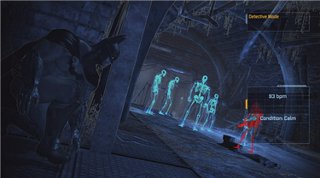Tasting Notes
I used to do this thing where I’d do a series of quick hits on my media diet, but damn, it looks like I haven’t done this in about five years? Let’s rectify that situation:
Television:
- The Good Place – I wasn’t expecting much, but then I burned through the entire first season in just a couple of days. It’s a fantastic season of television, very funny, great stakes, well paced (both in terms of individual episodes, but also in the way the series expands on its own world throughout the course of the season). There are some big twists that you might pick up on early in the season, but in general, the season works well as a whole. I’m somewhat wary of the forthcoming second season, but the writers managed to be pretty clever throughout the first season, so there’s a hope that the second season will work. But they’ll need to do something almost completely different with the premise this time around (otherwise, it could get very repetitive), which is a challenge.
- Patriot – What a fucking bizarre show. It’s clearly aping the prestige TV tropes out the yin yang (i.e.
Breaking Bad-esque cold opens, anti-heroes, etc…) and I can’t exactly say it’s planting any of its own flags, but I actually kinda liked it? I find it hard to recommend and when I break it down, it’s not super original and many of the characteristics of the show are things I don’t normally care for, but somehow it tweaked me just right. At least until the very end, which is an anticlimax (albeit one you can kinda see coming). It’s about a spy who goes undercover at a piping firm in order to travel to Europe and do some sort of deal to prevent Iran from going nuclear. Things immediately go wrong, and pretty much the whole series is an ever-telescoping series of crises built on top of crises. It has this ridiculous sense of deadpan dark humor (I think? Nothing about this show makes perfect sense to me…) that I don’t think I have any reference point for… It’s almost worth watching so that you can get to the Rock/Paper/Scissors game scene towards the end of the series, which is utterly brilliant. Again, a hard one to recommend though. It might be worth watching the first episode (it’s an Amazon Prime original though, so I think you can only see it there). If you’re on board with the ridiculous things that happen there, this series might be for you. I honestly still don’t know what to think about it, which probably means I think its good?
Movies:
- Dunkirk – Christopher Nolan’s WWII epic is indeed a spectacle to behold, one of the best photographed movies of the year and definite nominee for Most Visually Stunning in the Kaedrin Movie Awards. Not a ton of dialog and minimal plot, and yet it’s propulsively paced and at times harrowing. It’s not your traditional crowd-pleaser, but nods in that direction far enough to keep interest up. I hope it continues to do well. It will likely make my top 10 of the year, though perhaps towards the bottom of that list…
- The Big Sick – Delightful romantic comedy based on the true story of Emily V. Gordon and Kumail Nanjiani (who wrote the script), and you can see that heart up there on the screen. It deals a lot with family and culture clash in a sophisticated way, but it never drags at all, and is generally able to leaven the drama with comedy. Another film that will likely make my top 10.
- Baby Driver – Edgar Wright’s latest is fantastic entertainment, a sort of hybrid musical that substitutes car chases for dance numbers. This works spectacularly for the first two thirds, but there’s some serious third act problems with the story (lots of inexplicable decisions and character turns), even though the execution of what’s there is still very enjoyable. Hitchcock’s refrigerator comes to mind here – it works ok when your watching it, but does not hold up to scrutiny. Not a shoe-in for the top 10, but will definitely be a candidate and it will certainly garner a Kaedrin Movie Award or two. Still recommended!
Books:
- The Rise and Fall of D.O.D.O. by Neal Stephenson and Nicole Galland – I’m about two thirds of the way through this book, which features witches, a quantum mechanical explanation for magic, and lots of time travel. And bureaucracy. I’m pretty much loving it so far, but as a long-time Stephenson fanatic, I think you could probably have guessed that, right? Really curious to see how it will play out (seems like a solid candidate for a Hugo nomination for me). More thoughts forthcoming in a full review…
- Black Hole Blues and Other Songs from Outer Space by Janna Levin – Non-fiction story of gravitational waves and the LIGO project – an arduous, fifty-year endeavor to measure gravitation waves from events like two black holes colliding… So far seems to be pretty excessively focused on the personalities involved and the hoops they had to jump through to get funded, etc… Interesting stuff, but not necessarily the most immersive story.
- Killfile by Christopher Farnsworth – Trashy little thriller about a security consultant/spy who can read people’s minds. This is from the guy who wrote about the President’s Vampire, so we’re not looking for anything groundbreaking or anything, but it’s a fairly fun little story. I basically got this (and its sequel, which I didn’t like as much, but was basically more of the same) so that I could get a new President’s Vampire story (which I actually haven’t read yet and at this point, will probably save for the Six Weeks of Halloween), but these were an enjoyable enough diversion, if a bit formulaic and disposable…
Gaming:
- Friday the 13th: The Game – This is an online multiplayer game (not my usual thing) that is set in the Friday the 13th universe (emphatically my thing). The technical term for this type of game is “asymmetrical multiplayer” because while most of the players are camp counselors running for their life, one randomly selected player gets to be Jason, whose job is to hunt down and kill all the other players. It’s a lot of fun, even though I suck and the game and am not really willing to put the time into it to get good at it (the last time I played as Jason, I only killed one counselor and spent a couple minutes chasing one person around a table).
Worth checking out if this seems like your jam.
- Dominion – This is a deck-building card game that I stumbled onto because some folks at work started playing at lunch. I don’t always get to play there, but once I got into it, it’s a really deep and fun game to play. There’s an online version (linked above) that works well enough, though it could use some updates (it’s relatively new though, and they’re still making improvements). I still really enjoy the meatspace version, and it helps that my friends have basically all of the expansion packs (which add a lot of flavor).
The Finer Things:
- As always, I’m drinking a lot of beer and as you probably know, I have a whole blog where I keep track of this sort of thing. Recent highlights have all been IPAs, actually, like Tree House Julius and Burley Oak 100
- Since it always takes me, like, 2 years to get through a bottle of whisk(e)y, I was intrigued by the concept of an Infinity Bottle (aka Solera bottle), which is basically when you take a bunch of nearly finished bottles and blend them all together into one super-whiskey. I started a bourbon based bottle recently, mostly Four Roses based, but with some Stagg Jr. and Bookers. Biggest problem right now is that the proof is excessively high (approximately 122) at this point. I need to find some low proof stuff with some age on it (am I crazy, or is this a job for an orphan barrel bourbon?) Still, it’s a fun little project and it should get more and more interesting over time (as more and more whiskeys join the blend).
Phew, that’s all for now. I will be on vacation next week, so posting is dubious, though you never know!

